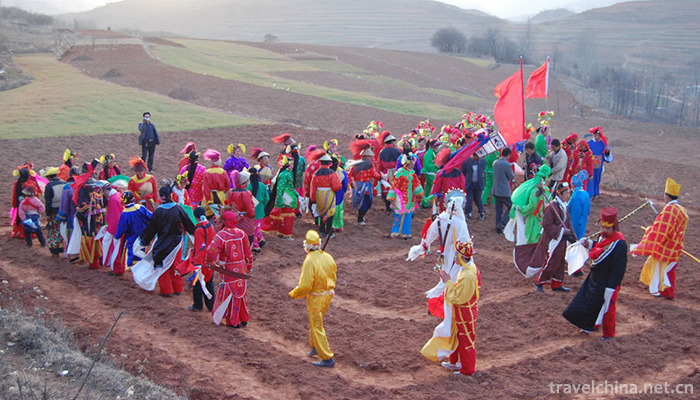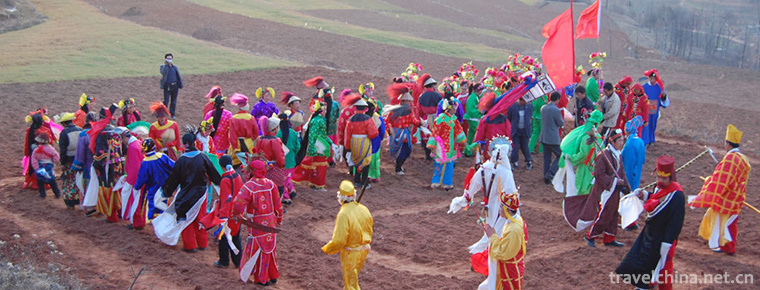Wudu Alpine Opera
Wudu Alpine Opera
Wudu Alpine Opera, also known as Alpine Opera, is one of the two unique local operas in Gansu Province. In 2008, Wudu Alpine Opera was selected as the second batch of national intangible cultural heritage list. The stage performances of "Alpine Opera" are generally divided into "stepping on the stage", "opening the curtain", "playing a small song" and "performing a story". Among them, "performing a story" is the formal content of "Alpine Opera", while other performances such as "Grand Villa", "Shang Temple" and "Walking Print" have obvious characteristics of praying for blessings, entertaining gods and entertaining themselves.
On June 7, 2008, the Wudu Alpine Opera declared by Longnan City of Gansu Province was listed in the second batch of national intangible cultural heritage list with the approval of the State Council. Heritage serial number: 735 IV-134.
historical origin
Alpine Opera originated in Yulong Town, Wudu District, Longnan City, Gansu Province. It mainly spreads in Yulong, Longxing, Jinchang, Longba, Hanwang, Ma Jie, Anhua, Foya, Ganquan, Jiaogong, Chengguan and other towns in Wudu District. It also spreads in Xihe, Lixian, Kangxian, Wenxian and Chengxian counties. Ichthyosaurus and other places belong to alpine and hilly areas, with deep mountains and gullies and inconvenient transportation. Potatoes, corn and wheat are the main agricultural products. Folk activities such as temple fairs, sacrifices and social fires have been prevalent here since ancient times. Alpine Opera is a kind of opera which is bred, evolved and developed from the folk sacrifices and traditional social fires here.
Before 1959, people in Yulong, Longxing and other places called it "storytelling", "going through the stage", "social fire drama" and so on.
In October 1959, it was named "Alpine Opera".
In 1965, it was published in Cihai Art Catalogue, Chinese Traditional Opera Culture and Dictionary of Chinese Traditional Opera Art. In 2008, it was recognized as a national intangible cultural heritage.
artistic characteristics
Stage setting
The stage performances of "Alpine Opera" are generally divided into "stepping on the stage", "opening the curtain", "playing a small song" and "performing a story". Among them, "performing a story" is the formal content of "Alpine Opera", while other performances such as "Grand Villa", "Shang Temple" and "Walking Print" have obvious characteristics of praying for blessings, entertaining gods and entertaining themselves.
Music for voices in a Chinese Opera
Alpine Opera is a kind of opera with opera brand. Its singing tone can be divided into two categories: Huanyin and Shangyin. Alpine operas such as "Huanyin" singing tones as "Gulu", "Ten Fans", "Jinzhuangyuan", "Zhuangyuan Huifu", "Entering Garden", "Menduer", "Taiping Year" and so on are lively, exquisite and beautiful, while "Shangyin" singing tones such as "Carmine Tears", "Rolling White Belt Crying Tune", "Wangge" are haunting and sad.
The language of Alpine Opera is a genuine Wudu dialect, lively and humorous. The Lyric format is relatively fixed, there are seven-character two-sentence couplets, five-character Four-Sentence quintessence, folk song style, rhyme poetry style and so on. A large number of linings and flexible forms of bangqiang constitute the unique singing style of Alpine Opera. The accompaniment instruments of Alpine opera are divided into martial music and literary music. There are big drums, big gongs and four tiles in martial music. The literary music includes "big tube", "earth pipa" and "erhu".
Performing characteristics
The performance of Alpine Opera has the characteristics of "Ba Dance" dancing, rocking, twisting and swinging steps in the social fire arena, but more actions are the reproduction and processing of life and labor by common people's actors. In recent decades, with the continuous participation of cultural artists, their performance level has been significantly improved. Alpine dramas are rich and colorful in content. Most of them have positive significance in promoting benevolence and morality and educating people.
Representational repertoire
Representatives of traditional plays include: Xianyang Bill Collection, Liu Four Bill, Lao Chang Shao, Baiyu Frost, Kangxi Master Bai, Er Jiniang Ugly, etc. Creating plays include "Open Lock", "Hu son-in-law", "Blocking Car", "Lao Xinhong", "Night Escape", "Special Party Fees" and so on.
Inheritance Significance
Alpine Opera has been circulating in Wudu and other places for hundreds of years, and is deeply loved by the people. It is the embodiment of the values and world outlook of the ancient working people, the witness of history and the spiritual food of the local people. The study of mountain opera culture will add new contents to the study of national folk culture and drama culture. Digging, rescuing and protecting Alpine operas can enrich people's cultural life, improve people's cultural quality, and promote the construction of a harmonious society and spiritual civilization.


-
1.Steamed Lotus Root Stuffed with Glutinous Rice
Osmanthus sweet-scented glutinous rice lotus root, also known as honey juice glutinous rice lotus root, is one of the characteristics of the traditional famous spots in the south of the Yangtze River.
Time 2018-10-27 -
2.Steamed egg with sand
Steamed eggs with ginseng sand is a traditional Chinese medicine, which has the effect of invigorating qi, nourishing blood and soothing the mind.
Time 2019-03-24 -
3.Carrying a number
Handling trumpets is one of the trumpets of traditional folk songs. It is popular in many fields, such as manual workers, such as loading and unloading, lifting, pushing and pulling goods.
Time 2019-04-03 -
4.Major tune
The major tune was originally called "drum tune". Varieties of Quyiqu. It was first prevalent in Kaifeng, Henan Province, and then spread to Luoyang, Nanyang and other places.
Time 2019-04-23 -
5.Traditional cooking techniques of Liao cuisine
In April 2016, "Liao cuisine traditional cooking skills" was approved by the State Council as a national intangible cultural heritage, Liao cuisine became the first major cuisine department
Time 2019-05-13 -
6.Female Book Custom
Jiangyong Nu Shu in Yongzhou, Hunan Province, is the only special written language for women in the world. Its development, inheritance and cultural information as symbols constitute the custom of wom
Time 2019-06-08 -
7.Production Techniques of Black Copper Walking Silver
The process of making silver from black copper is very complicated. Usually, it has to go through nearly 20 processes, such as refining copper, blanking, pattern carving, silver walking, forming, poli
Time 2019-06-29 -
8.Congratulations
Congratulations, also eulogies, Mongolian folk literature form, China's national intangible cultural heritage. Praise is a traditional folk literature form of Mongolian nomadic people in northern Chin
Time 2019-08-10 -
9.Southwest Jiaotong University
Southwest Jiaotong University is a national key university directly under the Ministry of Education. The first batch of national "double first-class", "211 project", "characte
Time 2019-08-31 -
10.Beijing Information Science And Technology University
Beijing Information Science and Technology University (Beijing Information Science and Technology University), located in Beijing City, is a city with a coordinated development of engineering, managem
Time 2019-09-21 -
11.Cheongsam and fan
As the saying goes, the pipa is half covered. What did ancient beauties use to cover their faces? The first reaction must be a fan! Fans are also the most common accessories in ancient times. Men use paper fans and women use round fans. Chinese traditional fan culture
Time 2020-12-11 -
12.Nanchong landform
Nanchong terrain inclines from north to south, with an altitude of 256-888.8 meters. The main geomorphic types are hills, and 1 / 3 of them are high hills and low mountains, middle hills and valleys, and low hills and dams. The geomorphic types of the whole city
Time 2020-12-17